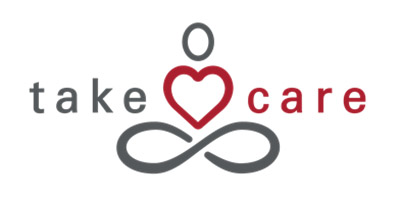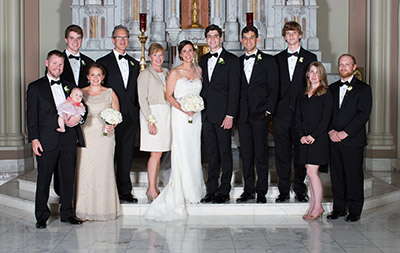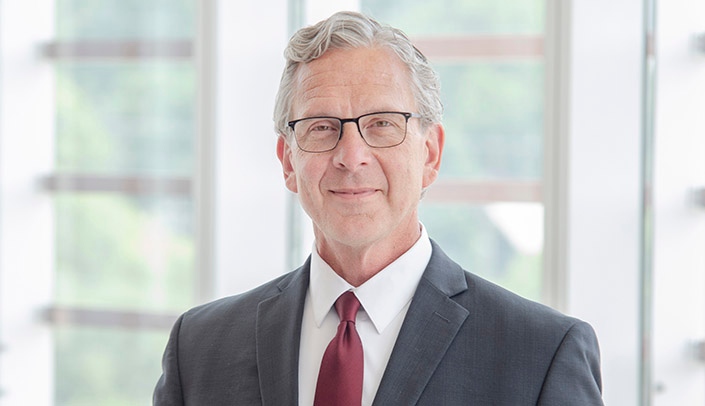This article is a part of a series focusing on the mental health of health care workers that will continue into Mental Health Awareness Month in May. If you would like to share your mental health story with others, email Steve Wengel, MD, assistant vice chancellor for Wellness, UNMC and UNO, and/or Sarah Richards, MD, senior medical director, Care Experience, Nebraska Medicine.
Looking back, I now know that alcohol affected me differently than most of my peers. I seemed to change more than they did from my baseline personality of being anxious, self-conscious and afraid. When they would get sick, they would say no more. When I got sick, I wondered when the next drink would be. I had the universe looking out for me, because there are more than a handful of times that I could have died. However, I thought alcohol was necessary for me to feel “normal.” A severe back injury in high school that led to hospitalization and opioid use introduced me to the power of these medications to alleviate my anxiety and make me feel better than I thought possible. I can still view my hospital room to this day, and that happened over 40 years ago. I also remember thinking that I wanted to feel like this all the time, forever.
 |
College and medical school were perfect backdrops for binge drinking, albeit excessive at times. Studies suggest that just over 90% of medical students drink alcohol, and about a third of medical students participate in binge drinking. Studies in medical residents, while lacking, suggest similar patterns. These types of data normalized my drinking. Others may have taken it as a cautionary tale!
I started to live a double life around the time my wife became ill with cancer and died two months later. Alcohol and opioids helped me cope with the grief, depression, anger and mostly fear of how I was going to raise four sons and continue to work in a busy pediatrics practice with every third night and every third weekend call. I put all my energy in trying to look superhuman during the day and make sure I had alcohol and opioids to sustain the unsustainable, when I should have been putting all my energy into caring for my kids. This is the most painful part of my story. I rationalized that if I was taking these drugs to medicate my pain, both physical and emotional, it was OK. But, I also worried that if anyone found out what I was doing, I would be devastated. In my mind, being seen as someone who was struggling with depression was much better that being seen as someone who was struggling with a substance use disorder. Just say no! Appearing weak was not an option! The ability to ask for help had been dampened by decades of competition which caused me to view knowledge, reputation and prestige as deities.
I want to digress into my family a bit at this point.
I grew up around many relatives with alcoholism in a family lifestyle where alcohol was the norm. My parents escaped the alcoholism part but unintentionally taught me that people who could not control their drinking were stupid, foolish, selfish and bad. The thought that I might embody that character fueled my drive to hide this life and stymied any thoughts I had about reaching out for help. That stigmatizing attitude was amplified as I watched one attending that I admired as a student morally admonish peers that had been “caught using drugs,” telling us that these physicians should never practice again. I feared the worst; that the other physicians in my hospital and community would look down on me, talk about me, and consider me as “less than” for my disease. Stigma led to shame and told me that I was a mistake, rather than a person who was making a mistake. Thus, I lived in the shadows.
My partners in my practice, however, were more than kind . . . and forgiving. When the cataclysmic pivotal event happened, namely being caught for fraudulent prescriptions by pharmacy staff who subsequently called my partners and personal physician about their concerns, I reluctantly went to treatment, but only for as long as I had to. I thought I was too important to my kids and my practice to be gone for very long. These very same partners supported my treatment and absence from the practice to find recovery. This literally saved my life. I have friends who were not so lucky.
This kind of pivotal event leading to a physician’s diagnosis of substance use disorder, getting help and entering into treatment is the rule. The exception to that rule is that we reach out for help before something bad happens. Though there have been some negative experiences, I will say that at first the medical community in my town was supportive for the most part. Many of the fears that I had about my peers seeing me as less than and not worthy of the privilege of being a physician haunted me. The fear of not being good enough, of being that weak, foolish, selfish person that I learned about from my parents’ attitudes about people with alcoholism was held at bay by the acceptance of my partners back into my practice. And I held it together.
That is, until I relapsed — twice. Fifteen years after my first treatment episode, with a series of short lapses in between, I had turned to both opioids and stimulants, writing scripts in my kids’ names by signing my partner’s name to the pad. This time, the continuous cycle of intoxication, withdrawal and constant anticipation and preoccupation almost killed me, and the consequences were much more severe. After more than four months of treatment split between a few years of time, my license was suspended then placed on probation. The DEA felt I was unsafe with a prescription pad, and my practice, half of which I owned, gently informed me that maybe I was not welcome back. The other physicians in my community confirmed my worst fears with a letter that I was permanently barred from privileges at our community hospital. I felt that I deserved this punishment and more.
This is where the desire to look like I have it all together became my undoing.
The realization that I might never work as a physician sank in. Depression was a constant companion for a long time, and suicide was an infrequent thought. However, this is also where I learned about the virtue of humility and the importance of grace. Humility for me became manifested in my ability to finally ask for help due to the depths of despair. I received a ton of assistance in learning that there is a resourcefulness, not in being the smartest and knowing it all, but of knowing who to ask for help and the courage to do so openly.
 |
Dr. Zoucha (fifth from left) and family. “My wife and kids were so generous with their love and forgiveness.” |
It was very weird at first. “Who are you and what have you done with Ken?” My wife and kids were so generous with their love and forgiveness. It was in this space that I launched what I thought was going to be my second career, counseling. However, as I was attending school to learn that noble profession, the cosmic tumblers fell into place, and I showed up at the right time, in the right place, in front of the right people. I landed a job as a medical director for a series of treatment centers for youth in the juvenile justice system, my primary role being the care of youth from all walks of life who had substance use disorders. This allowed me to become board certified in addiction medicine. Six years later, I found myself at UNMC with the honor of being a program director for an addiction medicine fellowship. None of that would be possible without the daily “treatment” that is an integral part of my life.
Today, I realize that if I had reached out for help sooner, I would not have had to go through so much pain and experienced so many sanctions. Nebraska now has programs designed for physicians who are struggling with mental health and substance use disorders, as do many other states. We are lucky to have a system that understands that these conditions are no different than our peers who are being treated for other health conditions, like diabetes. I have found a welcoming community of peers at Nebraska Medicine who consider me an equal and support my recovery wholeheartedly. With all this support I now know is available, there is no reason that reaching out for help can become the rule rather than the exception, that a cataclysmic pivotal event does not have to happen for help to be found. Today, I realize that reaching out is the courageous thing to do and is the only option.
I now use this journey to teach medical students and residents at UNMC about stigma and substance use disorders in health care professionals. The take-home messages are that we aren’t immune to addiction no matter how much we know about the disease and medications and that substance use disorder is not controllable without help from others. I also talk about what to watch for in themselves and their peers and how to approach someone they are concerned about. There are interventions that can be used to help cut through the fog of stigma: education about the disease of addiction, reflection exercises that discuss language, past experiences with persons with active use, and exposure to persons in recovery. I remember a one-hour video about physician alcohol use in medical school, and then learned a bit more in a wellness rotation during my fourth year of medical school. I think we all realize that medical education is doing much better than that now. We also know that information about self-disclosure by faculty members about their mental illness changes perception, ideas and attitudes of their students. Such exposures can favorably improve stigmatized views about psychiatry, and of patients or colleagues affected by psychopathology. I believe the same is true for self-disclosure about substance use disorders. I believe self-disclosure about personal addiction and recovery can improve learner-stigmatizing views of addiction medicine and of patients and colleagues affected by substance use disorders. These interventions have the potential to enhance medical student’s mental health and their health-seeking behaviors. If it can keep one person from having to go through what I experienced it will be worth it.
If you are feeling depressed, anxious and need to talk with someone, you can email the Peers in Need of Support program and/or contact our Employee Assistance Program through Arbor Family Counseling at 402-330-0960 or the Suicide Prevention Helpline at 1-800-273-8255. Also available is the Nebraska Licensee Assistance program to assist those with health-related service licenses, certificate holders and registrants.
